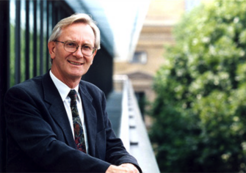Hubert Markl
President of the Max Planck Society from 1996 to 2002

He was a man who never took the easy way out, who made his feelings known with wit and eloquence: Hubert Markl left a lasting mark on the Max Planck Society as its President from 1996 to 2002.
Markl was born in Regensburg, Bavaria, on 17 August 1938. After passing his Abitur he attended Ludwig Maximilian University Munich to study biology, chemistry and geography. The professors who taught him included such well-known scientists as Martin Lindauer, Hansjochen Autrum and the future Nobel Prize winners Konrad Lorenz and Karl von Frisch. Markl was born on August 17, 1938 in Regensburg. After his A-levels, he studied biology, chemistry and geography at Ludwig-Maximilian-University in Munich. His teachers included such renowned scientists as Martin Lindauer, Hansjochen Autrum and subsequent Nobel Laureates Konrad Lorenz and Karl von Frisch. He obtained his doctorate at Munich in 1962 in the field of zoology, whereupon he spent a year working as an assistant professor. A research residency in 1965 took him to the US, where he spent time at Harvard, New York's Rockefeller University and the Tropical Research Station of the New York Zoological Society. He submitted his dissertation for his postdoctoral lecturing qualification on the "Communication behaviour of social insects" to the University of Frankfurt am Main in 1967.
Hubert Markl loved the natural world. When the conversation turned to ants or bees, to the subtleties of their communication, their odour orientation and their form vision, that's when the zoologist really felt at home. He developed a similar passion for books, like recent works by Bert Hölldobler, The Superorganism, or Bernd Heinrich's The Snoring Bird, Georg Forster's A Voyage Round the World and James Cook's Log Books. His successes in the Max Planck Society are something he was reluctant to speak about – "they're for others to judge," he said.
It was a time of change when Markl took the helm of the Max Planck Society as its President in 1996: six years after reunification, right in the middle of the efforts to reconstruct the former East Germany. The Max Planck Society did not have the financial scope for change. Savings had to be made at existing Max Planck institutes, money had to be invested in new institutes. In a tremendous act of will, the new President reduced and closed departments and institutes. But he was also able to set new courses in research with the appointment of 153 Directors.
That was when his reputation as a "tough character" was cemented. Those who feared his razor-sharp style of argumentation tried to stay out of his way. Those who dared could debate with him – and work well with him. "I'm sure I was sometimes fierce and impatient," he admitted. But he said it was always objective. "I wanted to keep up the high performance expectations at the Max Planck Society." Never taking the easy way out proved an "impressive push towards rejuvenation for the Max Planck Society", as Peter Gruss put it in a speech to mark the 70th birthday of his predecessor.
Markl also succeeded in furthering the advancement of talented young scientists: he founded the International Max Planck Research Schools. Since the year 2000, the number of doctoral students researching at Max Planck institutes has risen from 2,618 to a total of 4,308, with the vast majority of the recent graduates coming from abroad.
When the decision was made to examine and thereby come to terms with the history of the Kaiser Wilhelm Society in the Third Reich, it proved to be a bold retrospective. Hubert Markl appointed an independent Presidential Committee to research the transgressions of scientists and publish the findings. On 7 June 2001 he publicly admitted the guilt which the scientists of the Kaiser Wilhelm Society had brought down on themselves with their expulsion of Jewish colleagues and their involvement in Nazi crimes.
Whether it was on the freedom of stem cell research, the protection of biodiversity or good biology lectures – Hubert Markl always was a strident spirit who was not afraid of conflict and who consistently took a stance. He did not hesitate to make his feelings known when capable scientists were leaving Germany to go and work at American universities just as an Excellence Initiative had been launched in German universities or there was a massive shortage of young engineers coming up through the ranks.
After the end of his Presidency, he had time to read things that interested him, and no longer had to deal with up-to-the-minute issues. In 2008, the year of this 70th birthday, he looked back on his time as the top science manager in the Max Planck Society and stated: "If I were still President of the Max Planck Society, what I would take a look at today is whether science and business are in the right relationship with one another."
Hubert Markl died on January 8, 2015 after a prolonged illness at the age of 76.
